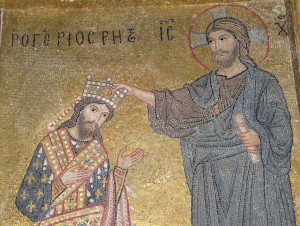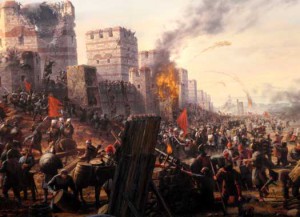 Jack asks if the Normans of Sicily spoke French or Italian. Roger I and his successors spoke the Norman dialect of French. But though this was the court language it wasn’t adopted by most subjects. (In a similar manner Norman French became the ‘official’ language of England for roughly two centuries, but the wider population retained their Anglo-Saxon) Most of the Norman’s subjects spoke Greek or Arabic, and continued to do so. The greatest linguistic influx was Italian as the Norman kings brought in mainlanders to repopulate land abandoned by the Saracens. Gradually this formed a unique language- Italian with loan words from French, Greek, and to a lesser extent Arabic. This Sicilian dialect still persists, though of course with modern communications and mobility its future is uncertain. Mainland Italian is taught in schools and the younger generation of Sicilians are much more likely to speak it then their regional dialect.
Jack asks if the Normans of Sicily spoke French or Italian. Roger I and his successors spoke the Norman dialect of French. But though this was the court language it wasn’t adopted by most subjects. (In a similar manner Norman French became the ‘official’ language of England for roughly two centuries, but the wider population retained their Anglo-Saxon) Most of the Norman’s subjects spoke Greek or Arabic, and continued to do so. The greatest linguistic influx was Italian as the Norman kings brought in mainlanders to repopulate land abandoned by the Saracens. Gradually this formed a unique language- Italian with loan words from French, Greek, and to a lesser extent Arabic. This Sicilian dialect still persists, though of course with modern communications and mobility its future is uncertain. Mainland Italian is taught in schools and the younger generation of Sicilians are much more likely to speak it then their regional dialect.
 Jodi asks where the Turkish people originated from and how they ended up invading the Byzantine empire. The Turks are relative newcomers to Anatolia. They are part of a much larger linguistic group called ‘Turkic peoples’. This would include the Bulgars, Avars, Uyghurs, Uzbeks, Petcheneges, and possibly Huns among many others. They all seem to have originated in Central Asia, probably near the Altay mountain range where modern Russia, China, Mongolia, and Kazakhstan meet.
Jodi asks where the Turkish people originated from and how they ended up invading the Byzantine empire. The Turks are relative newcomers to Anatolia. They are part of a much larger linguistic group called ‘Turkic peoples’. This would include the Bulgars, Avars, Uyghurs, Uzbeks, Petcheneges, and possibly Huns among many others. They all seem to have originated in Central Asia, probably near the Altay mountain range where modern Russia, China, Mongolia, and Kazakhstan meet.
The Seljuk Turks started to migrate west as early as the 6th century AD, but the main exodus took place in the 11th century when they were pushed by the Mongols. In 1071 they crossed Byzantine territory (Armenia) on their way to Egypt when the imperial army under Emperor Romanus Diogenes confronted them at Manzikert. The resulting three day battle was an almost unparalleled disaster for Byzantium. The army was destroyed and Romanus himself was captured. Even worse, the Seljuks (who had previously contented themselves with raiding) flooded into Anatolia, permanently wrenching it from Constantinople. The Seljuk empire, however, didn’t hold together for long. In 1299 a young Turk by the name of Osman broke free from the collapsing Seljuks and founded his own state which was named Ottoman in his honor.
By 1461 the Ottomans had absorbed the last remnants of Byzantium and had pushed deep into Eastern Europe. Their empire would last until the end of the First World War, at which time it was largely carved up by the Great Powers. The areas where the Ottomans were ethnically dominant (more or less) became the the borders of modern Turkey.
 Jack asks if the Normans of Sicily spoke French or Italian. Roger I and his successors spoke the Norman dialect of French. But though this was the court language it wasn’t adopted by most subjects. (In a similar manner Norman French became the ‘official’ language of England for roughly two centuries, but the wider population retained their Anglo-Saxon) Most of the Norman’s subjects spoke Greek or Arabic, and continued to do so. The greatest linguistic influx was Italian as the Norman kings brought in mainlanders to repopulate land abandoned by the Saracens. Gradually this formed a unique language- Italian with loan words from French, Greek, and to a lesser extent Arabic. This Sicilian dialect still persists, though of course with modern communications and mobility its future is uncertain. Mainland Italian is taught in schools and the younger generation of Sicilians are much more likely to speak it then their regional dialect.
Jack asks if the Normans of Sicily spoke French or Italian. Roger I and his successors spoke the Norman dialect of French. But though this was the court language it wasn’t adopted by most subjects. (In a similar manner Norman French became the ‘official’ language of England for roughly two centuries, but the wider population retained their Anglo-Saxon) Most of the Norman’s subjects spoke Greek or Arabic, and continued to do so. The greatest linguistic influx was Italian as the Norman kings brought in mainlanders to repopulate land abandoned by the Saracens. Gradually this formed a unique language- Italian with loan words from French, Greek, and to a lesser extent Arabic. This Sicilian dialect still persists, though of course with modern communications and mobility its future is uncertain. Mainland Italian is taught in schools and the younger generation of Sicilians are much more likely to speak it then their regional dialect.